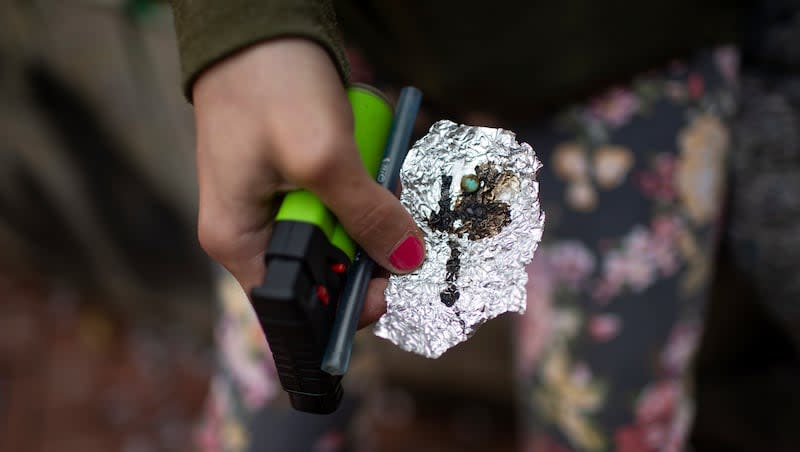Oregon’s path forward after impending recriminalization of drugs

Oregon voters passed a ballot measure decriminalizing possession of heroin, LSD, methamphetamine and other hard drugs in 2020.
Now lawmakers in the Beaver State are walking back that legislation.
During the state’s legislative session, Oregon lawmakers on both sides of the aisle passed a bill repealing the previous ballot measure, known as Measure 110. The state’s governor, Tina Kotek, hasn’t signed it yet. The bill would make personal possession of hard drugs punishable by up to six months in jail. It also provides a path to record expungement and encourages districts to divert people toward drug treatment instead of incarceration.
Moreover, a companion bill passed that would expand drug treatment services and makes it easier for people to access opioid treatment medication.
Proponents of Measure 110 said the measure would help people with drug addictions receive the treatment they need rather than face jail time. Critics said the measure would end up disincentivizing drug treatment. The law took effect in 2021.
In addition to decriminalizing personal possession of drugs, Oregon’s measure also allocated hundreds of millions of dollars to establish and augment drug treatment services. But, according to Oregon Public Radio, the expansion of these treatment services was delayed and took longer than anticipated.
A key question has arisen during the discussion of Measure 110 and its potential repeal: Does decriminalization of drugs increase, decrease or have no impact on overdose deaths?
Since voters passed the ballot measure in 2020, overdose deaths have grown in the state. According to the Oregon Health Authority, 472 people died of an unintentional opioid overdose death in 2020. By 2022, the number was 956.
Using data from the U.S. Centers for Disease Control and Prevention’s annual report, Reuters reported that Oregon’s increase in overdose deaths was at an 11% increase from 2022 to 2023 compared to the nation’s overall increase of 0.7%.
Health economics researcher Noah Spencer published a 2023 report in the Journal of Health Economics evaluating the impact of Measure 110. Using a data analyzation method, Spencer said he found “when Oregon decriminalized small amounts of drugs in February 2021, it caused 182 additional unintentional drug overdose deaths to occur in Oregon in 2021.”
During a Oregon Measure 110 Research Symposium, four researchers with different expertises gave a presentation saying that their research shows Oregon’s increases track with what happened in other U.S. states and correlate with when fentanyl became part of the unregulated drug supply.
“There is no evidence that increases in overdose mortality in Oregon are due to M110,” they wrote.
Keith Humphreys, a Stanford psychology professor, told The Wall Street Journal that he thinks people who passed the measure “misunderstood addiction.”
Testifying before a Oregon Senate committee in 2022, Humphreys said, per Oregon Public Radio, “On the one hand we have highly rewarding drugs which are widely available, and on the other little or no pressure to stop using them. Under those conditions we should expect to see exactly what Oregon is experiencing: extensive drug use, extensive addiction and not much treatment seeking.”
During the first year of decriminalization, Oregon Health Authority reported data showing that around 16,000 people did access drug treatment services. Only 0.85% of that group or 136 people actually entered programs at service centers to get off drugs.
Measure 110 made it so law enforcement would give tickets with an associated maximum fine of $100 to incentivize people to enter treatment.
It’s different than the way Portugal has approached decriminalization, Humphreys said, per Oregon Public Radio. “The open use and flagrant drug dealing that we see in West Coast cities in this country are virtually absent in Portugal, which shuts them down and uses court pressure to get people into treatment. I’ve spent a lot of time in Portugal, and I know the people who designed their policy. So please take it from me, Oregon is not following Portugal’s example and will not get its results.”
One central concern with repealing Measure 110 is that it would result in a surge of arrests. According to Oregon Public Radio, around 1,333 would be convicted of drug possession and 533 could be incarcerated if the measure is appealed.
This concern is multifaceted. If a person is incarcerated for personal possession, when they get out of jail, they have a criminal record. That criminal record could impact employment and housing opportunities. Lawmakers also expressed concerns about fairness and equal implementation of the repeal.
“The fundamental flaw with Ballot Measure 110 was that it decriminalized first and only slowly funded, designed and implemented the needed treatment programs,” state Sen. Michael Dembrow, D-Portland, said according to Oregon Public Radio. “In its current form, there are just too many question marks around its potential to be effective, and particularly to be implemented in a fair and nondiscriminatory manner, around the state.”
Other lawmakers say they support the repeal because “it’s not a return to the war on drugs,” as state Sen. Jeff Golden, D-Ashland, said, per Oregon Public Radio. “I’ve given that vow to those in my district who are desperately afraid of what’s about to happen.”

